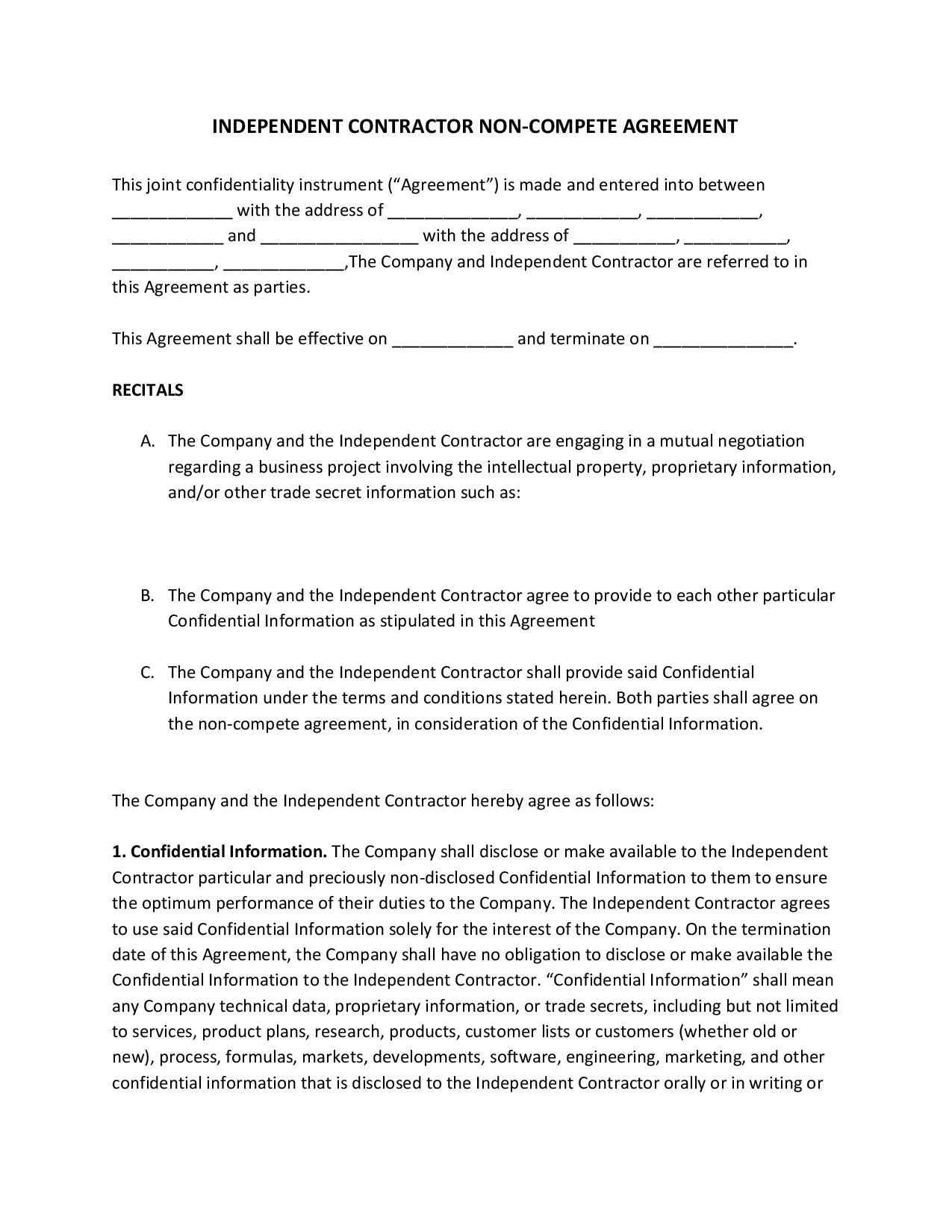- Eviction Notice Forms
- Power of Attorney Forms Forms
- Bill of Sale (Purchase Agreement) Forms
- Lease Agreement Forms
- Rental Application Forms
- Living Will Forms Forms
- Recommendation Letters Forms
- Resignation Letters Forms
- Release of Liability Agreement Forms
- Promissory Note Forms
- LLC Operating Agreement Forms
- Deed of Sale Forms
- Consent Form Forms
- Support Affidavit Forms
- Paternity Affidavit Forms
- Marital Affidavit Forms
- Financial Affidavit Forms
- Residential Affidavit Forms
- Affidavit of Identity Forms
- Affidavit of Title Forms
- Employment Affidavit Forms
- Affidavit of Loss Forms
- Gift Affidavit Forms
- Small Estate Affidavit Forms
- Service Affidavit Forms
- Heirship Affidavit Forms
- Survivorship Affidavit Forms
- Desistance Affidavit Forms
- Discrepancy Affidavit Forms
- Guardianship Affidavit Forms
- Undertaking Affidavit Forms
- General Affidavit Forms
- Affidavit of Death Forms
Independent Contractor Non-Compete Agreement
Small-scale and large-scale businesses outsource services that are not available in their company. Hence, the need for collaboration for a short period arises. Ensure that all sensitive information remains confidential during the collaboration by using an independent contractor non-compete agreement. This agreement obligates the contractor to keep your secrets secret and mandates them not to compete against you. Know more about this type of agreement by reading below. Read More
Independent Contractor Non-Compete Agreement
What Is an Independent Contractor Non-Compete Agreement?
An independent contractor non-compete agreement is a legally binding document between the company and the independent contractor. This type of agreement obliges the independent contractor not to divulge any sensitive information to a third party or another entity. It also prohibits them from using confidential information against them. The independent contractor is forbidden to work for a competitor or work in the same industry. This agreement is commonly signed with an independent contractor non-disclosure agreement. However, in states such as North Dakota, California, Oklahoma, and Montana, non-compete agreements are not enforceable for employees. Non-compete agreements are only allowed in limited, particular situations.
How to Create an Independent Contractor Non-Compete Agreement
The tips provided here are specific to the mentioned agreement. However, these are not the only provisions that should be in the document. Read our tips below to get you started:
1. Introduce the Parties and Include Recitals
Every agreement always starts with an introduction of both parties. Introduce the company and the independent contractor by citing their full names and complete mailing addresses. Next would be the recital. This component explains what the agreement is for, the intentions of both parties, etc. It is also similar to a preamble.
2. Expound the Confidential Information
Here, you are going to cite all the sensitive or confidential information that the contractor has to keep secret. The information may include proprietary information, technical data, customer lists, product plans, and others. In a separate provision, cite the representatives, agents, and employees that are required to treat the information with the same confidentiality. Furthermore, in another section, specify the exclusions of the confidential information. The exclusions are publicly known information, information that is obtained by the contractor from a third party, and information that was already known to the contractor before the signing of the agreement.
3. Cite a Provision for Independent Contractor
Independent contractors are sometimes mistaken as employees. Well, they are not. They are a separate entity from the company and are temporarily working with the company. They work under an agreement with the company that lasts for a short period. The agreement must emphasize that the independent contractor is not an employee and that they are not entitled to the same benefits as the employees. They will be responsible for securing their own insurance, social security, and other benefits.
4. Detail a Provision for a Non-Compete Clause
This provision will forbid the contractor from engaging in operations similar to your company. Usually, a period of one year is given to the contractor. Doing so will help you prevent unfair competition, retain your cherished employees, and protect confidential information.
5. Review the Document Carefully
Legal complications may arise in the future if you don’t write and review your agreement properly. Review the document if you have all the complete clauses or provisions needed for the transaction. If you want to be sure, you can always consult with your lawyer to avoid worries.
6. Close the Deal with Your Signatures
Lastly, close the deal by signing the document with the contractor. Don’t forget to include the date with your full names and signatures. Make sure that both of you have copies of the agreement for personal records.
Frequently Asked Questions
What is the purpose of a non-compete agreement?
A non-compete agreement prohibits the contractor or another entity from participating in the same industry as the company. This is to keep the employees avoid the potential leakage of sensitive information and many more. However, some state laws prohibit non-compete agreements, except in particular circumstances.
What happens if a non-compete agreement is violated?
According to Malescu Law, if a non-compete agreement is violated in a state where it is enforceable and valid, the party responsible can be filed for a lawsuit. This means that they have to pay for the damages and the injunction.
How long should a non-compete agreement last?
Usually, non-compete agreements last up to three years. For a non-compete agreement to be enforceable in some states, the duration must be reasonable. If the non-compete agreement exceeds two to three years, it might not be enforceable in court.
What is an independent contractor?
An independent contractor is an entity or business that offers a set of products and services to another entity. They work with the company under an agreement with a set of terms and conditions. As previously mentioned, they are not employees. Therefore, they are not entitled to the same benefits as the company’s employees.
Does a non-compete agreement need witnesses?
No. A non-compete agreement does not need any witnesses to be legally binding. As long as both parties sign the document, it should warrant the agreement as legally binding. Some states may require you to notarize the document or have a witness.
Everyone in the same industry as you has gone the extra mile to stay relevant. And you should too. It is becoming hard to outrun your competitors because of the novel ideas they have absorbed that the Western culture has heavily influenced. The strategic move for you would be to collaborate with a contractor to come up with a fresh set of ideas. The very same concepts can be stolen or leaked if you are not careful. And you would not want that to happen—that’s why this type of agreement is extremely advisable to prevent such mishap. Not only does this prevent undesired leakage, but it also forbids your contractor from engaging in operations that are in direct competition with your company. Keep your vital information close by starting with this agreement.

